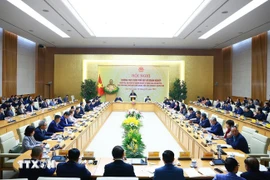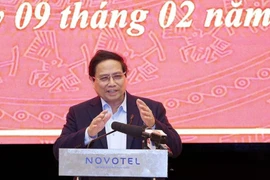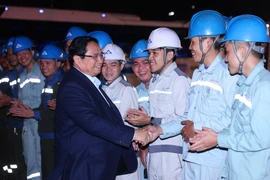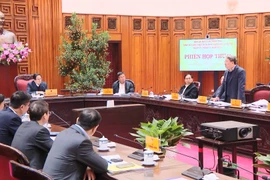Hanoi (VNA) - Prime Minister Pham Minh Chinh urged ministries, sectors, and localities to ensure a favourable environment for business and investment activities of enterprises, making it easier for them to make greater contributions to the nation’s development.
Chairing a meeting between permanent Government members with leaders of businesses on February 10, which aimed to discuss solutions for private enterprises’ acceleration and breakthroughs to promote the country’s rapid and sustainable development in the new era, PM Chinh acknowledged and highly evaluated responsible opinions of delegates, stating that through the meeting, leaders of the Party, State, and ministries, and businesses gained a deeper understanding and shared more.
He highlighted the great contributions of businesses and entrepreneurs to the country’s development accomplishments in the 40-year “Doi moi” (renewal) process, especially during times of crisis and difficulty such as the COVID-19 pandemic, and natural disasters. The PM noted that the private sector currently contributes nearly 45% to the nation's GDP, and over 40% of the total social investment, provides jobs for 85% of labourers nationwide, accounts for 35% of the country's total import turnover, and 25% of total export turnover.
The Government leader affirmed that the Party and State always implement numerous policies and laws to support and create favourable conditions for the development of businesses and entrepreneurs.
He demanded ministries, sectors, localities, and especially businesses, to achieve growth rates that are equivalent to, or even higher than the country's growth target, thus enabling the nation to relise its key goals by the 100th founding anniversary of the Communist Party of Vietnam in 2030.
PM Chinh hoped that the business community and entrepreneurs will take the lead in innovation, accelerating scientific-technological development and digital transformation, towards making more contributions to implementing strategic breakthroughs on institutional reform, infrastructure development, and human resources training, helping the country reach rapid and breakthrough growth, and promote inclusive, comprehensive, sustainable development.
The PM also urged promoting the building of digital economy, green economy, circular economy, creative economy, and sharing economy. He called on businesses to join global value, supply and production chains to enhance national brands; actively contribute to social welfare programmes, and support the Government’s programme to eradicate temporary and dilapidated houses.
Representatives from businesses expressed their strong support, and pledged to proactively join national programmes initiated by the Party and the State, contributing to the country's goal to expand GDP by at least 8% in 2025, and reach double-digit growth in the coming years.
Notably, businesses showed their readiness to engage in large-scale national projects, including the North-South high-speed railway; standard-gauge railways connecting with China; urban railways; the nuclear power projects; science and technology development programmes; innovation initiatives; and projects exploring underground, marine, and space resources.
Tran Ba Duong, Chairman of the Board of Directors of Truong Hai Group JSC (THACO), stated that with its highly qualified engineers and expertise in product research and development, and international cooperation, THACO is committed to make a rational technology transfer and localised production to serve railway projects, aiming to reduce costs, ensure quality, and enable small and medium-sized enterprises to participate in its supply chain.
Meanwhile, Tran Dinh Long, Chairman of the Board of Directors of Hoa Phat Group JSC, affirmed his firm's readiness to invest in and supply products for urban railway projects in Hanoi and Ho Chi Minh City, Lao Cai – Hanoi – Hai Phong railway project, the North-South high-speed railway. He stressed that Hoa Phat can ensure quality, timely delivery, and lower costs compared to imported products.
Representatives from businesses suggested the Government, ministries, and local authorities continue addressing obstacles related to land laws, planning, procedures, licensing, and mechanisms to unlock potential resources. They called for financial support and tax policies tailored to priority sectors and projects.
FPT Chairman Truong Gia Binh noted that Vietnam’s scientific potential has doubled relative to its GDP. He proposed integrating AI into the curriculum across all education levels to speed up Vietnam’s transformation into an AI-driven nation.
Chairman and CEO of T&T Group Do Quang Hien proposed accelerating the equitisation of state-owned enterprises, suggesting that enterprises that no longer require state ownership can have their capital fully divested./.
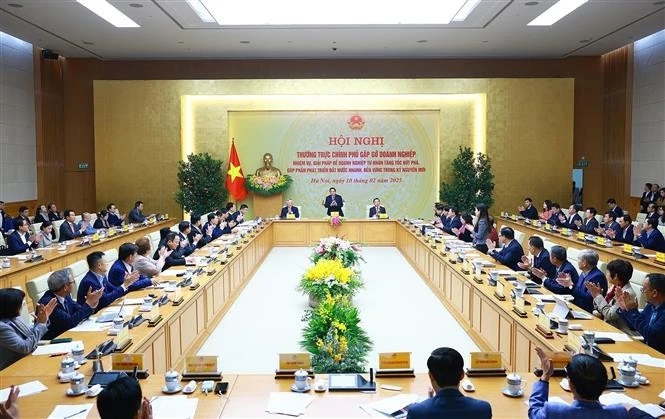
See more
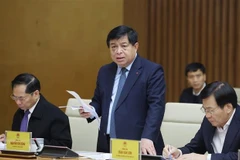
Six directions outlined to boost Vietnam’s private sector
He urged large enterprises to lead national challenges and innovative projects, while encouraging small- and medium-sized businesses to innovate, improve management and build global Vietnamese brands.
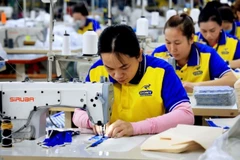
Sustainable fashion presents promising niche market for textile manufacturers
The combination of sustainability and culture will open up more opportunities for Vietnamese textile enterprises to strengthen their position in the global market and capture the promising Nordic fashion market.

Vietnam Airlines ranked among top 20 world's best airlines
Vietnam Airlines joins other top carriers like Korean Air, Qatar Airways, and Singapore Airlines in the prestigious Top 20 World's Best Airlines for 2025 by AirlineRatings.

Vietnam Airlines to launch direct Nha Trang – Busan route on June 1
With an expected one flight daily, the new route will increase the total number of flights between Vietnam and the RoK to over 50 per week.

Export of aquatic products tops 774 million USD in January
Shrimp continued to lead the sector, generating 300 million USD in revenue and accounting for 39% of the total export.
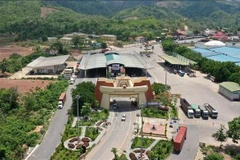
Nearly 200 projects registered in Quang Tri's IPs
Two economic zones and two industrial parks in the central province of Quang Tri have so far attracted nearly 200 investment projects, with a total registered capital exceeding 172.4 trillion VND (6.78 billion USD) and a planned land use of over 5,978ha.
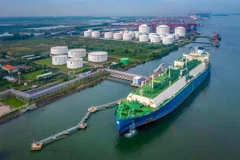
Petrovietnam exceeds business, financial targets in January
Petrovietnam surpassed its planned targets in January, with several key indicators showing growth compared to December 2024.

Facilitating FDI companies for listing: SSC
This move is expected to inject new dynamism into the market, fostering a more robust investment environment and potentially attracting more foreign capital inflows.
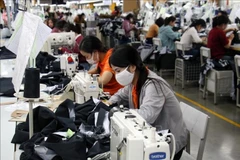
Vietnam sets sight on 8% economic growth with drastic steps
To achieve the 8% economic growth this year, Deputy Minister of Planning and Investment Tran Quoc Phuong said comprehensive solutions across all sectors have been outlined in the Government’s Resolution 01.

Reference exchange rate rises at week’s beginning
The State Bank of Vietnam set the daily reference exchange rate for the US dollar at 24,487 VND/USD on February 10, up 25 VND from the last work day of the previous week.
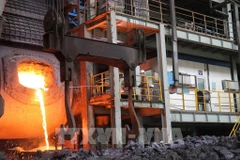
Vietnam’s industrial production inches up 0.6% in January
According to Director of the GSO’s Industry and Construction Statistics Department Phi Thi Huong Nga, Vietnam could achieve breakthrough industrial growth in 2025 and beyond by leveraging its advantages and accelerating digital and green transformation as well as meeting the increasingly stringent requirements of the international market.
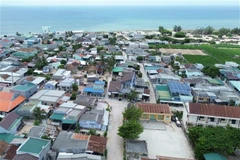
Five local areas eligible for large-scale nuclear power plant construction in Vietnam
With this nuclear power scenario, the provinces are located in the south central, central and north central regions.
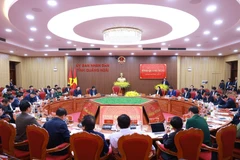
PM sets 10.5% growth target for Quang Ngai province
Prime Minister Pham Minh Chinh laid stress on the need for innovative thinking, long-term vision, and bold action to transform Quang Ngai’s economic landscape.

China–Vietnam rail freight soars in January
China's Guangxi province exported 3,062 TEUs of goods to Vietnam in January, a year-on-year increase of 760%.

PM orders comprehensive reports on stalled investment projects
Prime Minister Pham Minh Chinh has ordered comprehensive reports on delayed investment projects and those with challenges so as to craft measures to remove the bottlenecks.
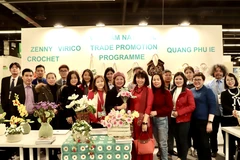
Vietnam showcases products at Germany consumer goods trade fair
Vietnam has been participating in Ambiente, the world's leading trade fair for consumer goods, handicrafts, and interior decorations, for over 20 years.

Vietnam – US trade tops 11 billion USD in January
In January, Vietnam’s export to the US reached 9.8 billion USD, while import stood at 1.3 billion USD, resulting in a trade surplus of 8.5 billion USD.
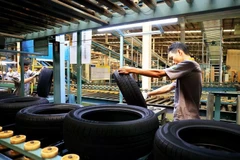
Foreign investors channel 101 million USD into Tay Ninh last month
As of January 22, Tay Ninh province housed 394 foreign invested projects worth more than 10.2 billion USD in value.

HCM City residents increase consumer spending during Tet holiday
HCM City’s Tet spending rose, with retail and service revenue reaching 108 trillion VND (4.3 billion USD) in January, up 7.5% year-on-year.

Vietnam's car industry to diversify supply chain
While China remains a significant supplier, recent trade data highlights Vietnam’s efforts to diversify supply to meet industry demands.
